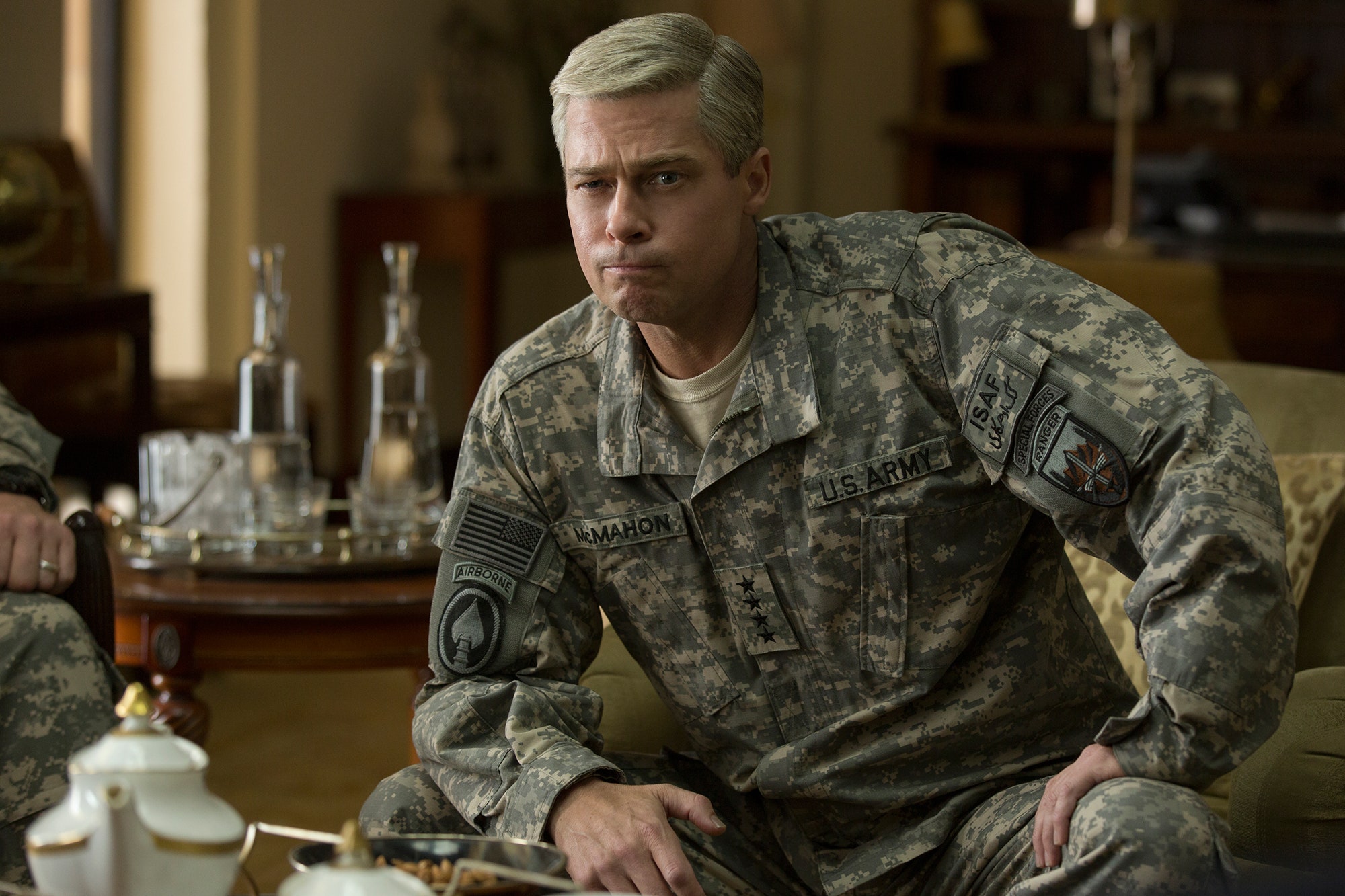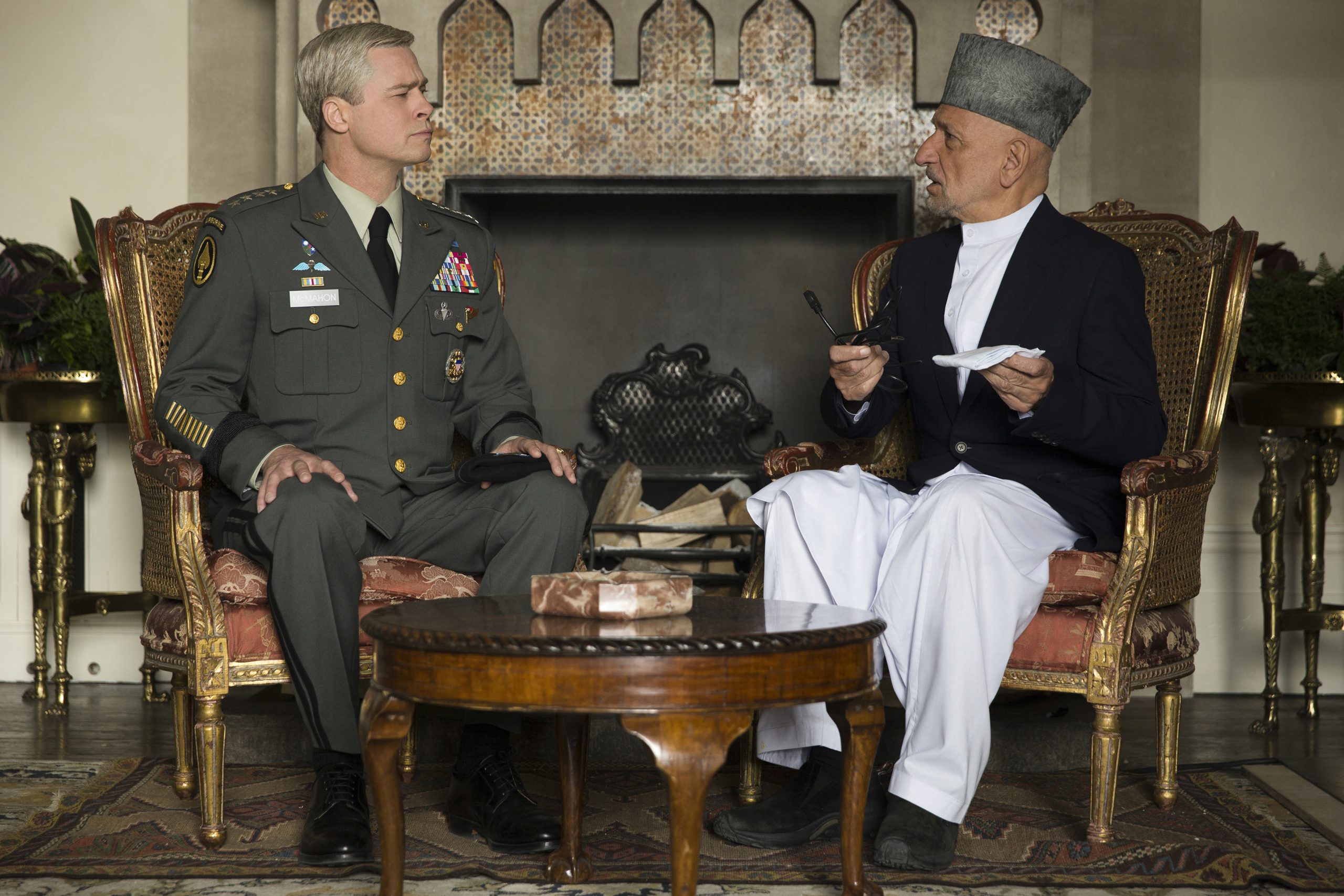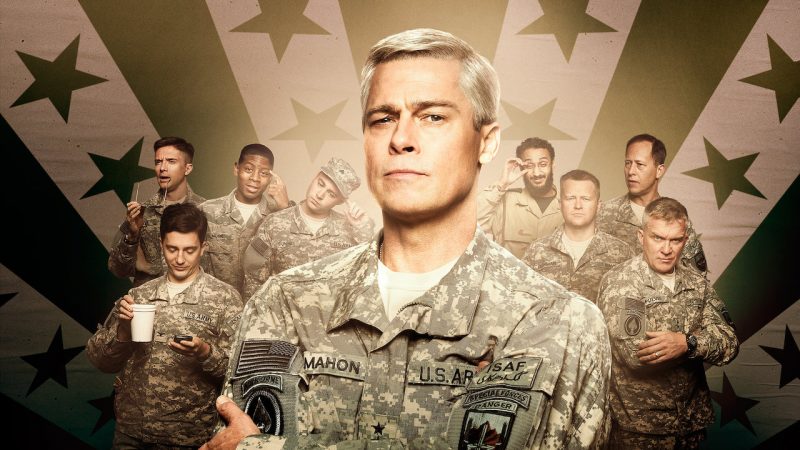“In the good old days, wars were fought against conventional armies from nation-states. Guys in uniforms, like Nazis and stuff. When, however, you’ve just gone and invaded a place that you probably shouldn’t have, you end up fighting against just regular people in regular-people clothes. These guys are what are called insurgents. Basically, they’re just guys who picked up weapons ’cause… so would you, if someone invaded your country. Funnily enough, insurgencies are next to impossible to defeat. And so, if you wanna go on pretending you can win, you’re really left with no option but to try to convince the country you’ve invaded that you’re actually here to help.”
If you are seeking a high-octane, action-packed war film with bullets flying through the air, I’m afraid you are in the wrong place. “War Machine” allocates merely 5 minutes to its war scenes. Instead, it endeavors to answer the question of why wars happen. “War Machine” is a rather tragicomic portrayal of America’s aimlessness in the East. Recently, there have been numerous films critiquing America’s policies related to the countries it is involved in wars with. They all pose the question, “Why are we fighting?” while criticizing their own nation. However, none of them are as successful as “War Dogs” and “War Machine.” Particularly in the case of “War Machine,” when you consider that the characters are real people and the story is told from their perspective, the absurdity of the film reaches its peak.
I don’t know if you are aware, and honestly, I am not entirely sure myself, but America is currently involved in wars, directly or indirectly, in numerous countries. They declare war on someone almost every day. Yet, even they are not entirely sure why they are declaring these wars. Throughout history, we have watched many films about American soldiers sent to their deaths, such as “Platoon,” “The Thin Red Line,” “Apocalypse Now,” and many others, all depicting the struggle for survival of soldiers who die aimlessly. These are stories of two sides needlessly staining the lush greenery with red. But “War Machine” doesn’t depict any war. It doesn’t paint our vision with green and red. Instead, it attempts to reveal the unnecessary presence of the military in the Eastern deserts, focusing on the events happening behind the scenes of the war, as seen through the eyes of the soldiers.

Starring Brad Pitt, the film tells the story of Glenn McMahon, a soldier who has devoted his life to the military. McMahon is sent to the East by America, which uses ambitious individuals like him who have devoted their lives to the military and have only seen their spouses for 30 days in 8 years, to keep the so-called war in the East under control. These individuals are regularly replaced. Whenever these soldiers find themselves unable to handle the situation or begin to question it, America sends a new madman.
Glenn McMahon is just one of these individuals. He claims he will bring peace by occupying Afghanistan. He truly believes in this mission. He is a man with routines, seeing the world through his own set of rules. He might be described as lacking in culture, but he is certainly not without knowledge. His team is much the same. Glenn promises peace to the lands he has occupied. The strange part is that Glenn and his army believe so strongly in their mission that they can even go against the orders of their superiors. This is one of the most intriguing aspects of the film. The movie depicts how top-level executives manipulate and control the army through the ambitions of men who have devoted their lives to the military. While the soldiers believe they are fulfilling their patriotic duty, the executives don’t even want to make eye contact with these soldiers. Glenn only meets President Obama, who gives him direct orders, once during his entire military career; he receives all his orders indirectly from various men in different suits.
Because of ambitious individuals like Glenn, the army is easily manipulated. The German journalist, portrayed by Tilda Swinton, asks him the following question during his press conference:
“Are you aware that your ambition is driving you too far?”

One of the most striking questions posed by the film is this: The American government seems to have gotten what it wanted, as it declares that the military will withdraw from the East within 18 months. This enrages Glenn and his team because the passionate team, burning with “duty,” begins to think that their superiors are trying to hinder them. Wars, arising from the financial concerns of men in suits, continue to lengthen due to the dedicated but clueless soldiers, thousands of kilometers away, who are passionately driven by patriotic fervor.
One of the poignant lines that underscores the irony of the chaos in the East comes from young soldier Cole:
“Okay, but I can’t tell the difference between the people and the enemy. They all look alike to me. I’m sure they’re the same people, sir.”
The young soldiers are confused. They are not wanted in the lands they came to rescue and create freedom. They are ostracized no matter whom they interact with. They feel like excess baggage in the region. They want to help, but they have no idea how to do it.
When you invade a place, they, too, will raise arms against you. You call those who raise arms against you “rebels.” You claim to protect the people. But who are “the people”?
Glenn is so consumed by his ambitions that he doesn’t realize that his actions are only making matters worse. The irony here is that he explains why the war is escalating with a formula, yet he is incapable of understanding his own formula. He says while drawing on the board:
“Let’s say you have ten insurgents. Huh? Now, let’s say you kill two of ’em. Now, how many insurgents do you have left? Hmm? Hmm? Well, you’d say eight, of course. Eight. Right? Right? Wrong! In this scenario, ten minus two equals 20. Let’s say the two insurgents you just killed, uh… each had six friends or brothers or some such, who are hovering on the brink of… of joining the insurgency. They’re thinking about this insurgency thing. “Looks interesting. But, you know, for one reason or other, not for me.” But… So, then you go and kill their friend. Now you’ve just made up their minds for ’em. Those hovering friends are now full, paid-up members of the enemy. Yeah. And so, in the math of counterinsurgency, ten minus two… equals 20.”
Glenn tours the city and meets with the citizens, telling those who advise them to “leave now, the situation worsens as you fight,” but he stubbornly insists, with his fatherly demeanor, on saying, “We will bring peace.” Meanwhile, the citizens’ rebellion ends up validating his own formula.

Another distinguishing feature of “War Machine” compared to other war films is its attempt to depict the aimless military activities in the East. They tour the city, make promises to the country’s citizens that they have occupied, and do whatever they want, proclaiming, “We are bringing peace.” They also claim that they need 40,000 more soldiers as they see fit, sending thousands of children to their deaths. They participate in conferences in Europe, give interviews to magazines and newspapers, and despite declaring that they are at war, they do not give up on any kind of aimlessness. And this aimlessness becomes Glenn’s downfall. In an interview with Rolling Stone magazine, Glenn loses his job due to the writer’s unfavorable spin. The film ends with a poignant question:
“Why the hell did Glenn McMahon talk to a Rolling Stone reporter?”
“War Machine” is one of Netflix’s most profound films, given its infrastructure and message. It tells the story of how ambitious but paternal figures at the helm of the military are manipulated and used by men in suits, depicting America’s attempts to obtain everything it desires through force and a smiling face. In the film, where Ben Kingsley plays President Karzai, the sentence Karzai utters is, in fact, a summary of the film and the absurdity in the East. Glenn, who wants to initiate the Black Operation, seeks permission from the country’s president. When the president does not answer the phone, he goes to his house and says that they will attack if he gives permission. Karzai responds as follows:
“You have my approval, General. We both know it was never really mine to give, but… I thank you for inviting me to participate in the *theater* of it all. And good luck. I wish you much success.”

Cast & Crew
director: David Michôd
writers: David Michôd
starring: Brad Pitt, Anthony Michael Hall, Emory Cohen, John Magaro, Topher Grace, Daniel Betts, Aymen Hamdouchi, Alan Ruck, Anthony Hayes, RJ Cyler, Nicholas Jones, Will Poulter, LaKeith Stanfield, Ben Kingsley, Meg Tilly
USA | 2017 | 122 MINUTES |
